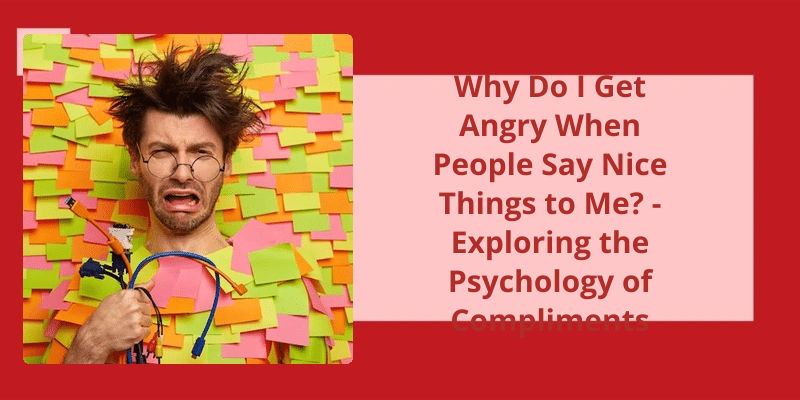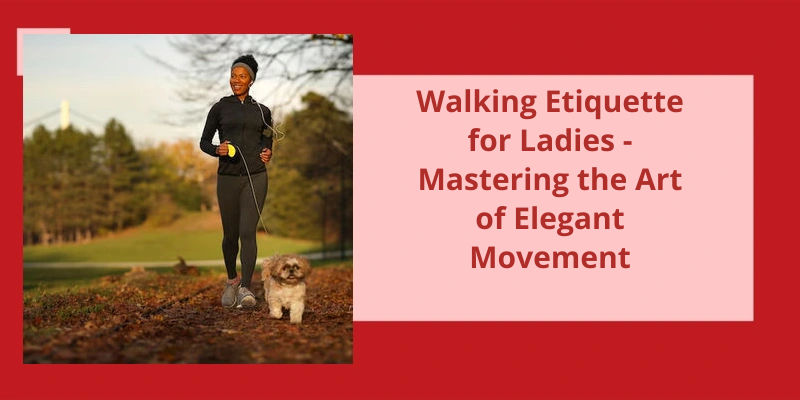As human beings, we’re complex creatures with varying emotions that can be triggered by a multitude of stimuli. Sometimes, it's easier to understand why we get angry when someone says mean or hurtful things to us, but what about when it's the opposite? Why do we sometimes feel a surge of anger or frustration when someone offers us a compliment or says something nice? While it may seem counterintuitive, this reaction isn’t uncommon. In fact, there are several psychological and emotional factors at play that can contribute to this response. From issues of self-esteem and self-worth to fear of vulnerability and rejection, the reasons behind why we get angry when people say nice things to us are complex and multifaceted. Understanding these underlying factors can’t only help us better navigate our own emotions but also improve our relationships with others.
Why Do I Get Mad When Someone Does Something Nice for You?
It’s important to understand that this isnt a personal flaw or something to be ashamed of. It’s a defense mechanism that you developed because of your past experiences. By recognizing these feelings, you can start to work through them and develop new, healthier responses to kindness.
This process can be difficult and uncomfortable, but it’s necessary for personal growth and healing. Therapy can be a helpful tool for working through these issues and learning new coping mechanisms. It’s also important to surround yourself with positive, supportive people who can help you feel safe and loved.
It’s also worth noting that this reaction formation can manifest in different ways for different people. Some may become angry or defensive, while others may feel anxious or guilty. It’s important to recognize your own unique response and address it in a way that works for you.
Ultimately, the goal is to be able to accept kindness and love without feeling threatened or overwhelmed. This requires a lot of inner work and self-reflection, but it’s worth the effort in order to experience deeper connections and more fulfilling relationships.
It’s okay to struggle with accepting kindness, and it’s okay to seek help in working through these issues. Remember that you’re worthy of love and kindness, and that healing is possible.
It’s no secret that compliments can evoke a range of emotions in people, from joy to discomfort and even irritation. But have you ever wondered why you might feel the latter? As it turns out, there could be an underlying reason behind your negative reaction to compliments.
Why Do Compliments Irritate Me?
Have you ever found yourself getting uncomfortable when someone gives you a compliment? Have you ever wondered why you cant just accept it graciously and move on? The truth is, many of us struggle with compliments, and it’s not because weren’t grateful for them. It’s because compliments can feel like a threat to our sense of self and our ability to control how others perceive us.
They may worry that the compliment is insincere or that the person giving it’s an ulterior motive. Others may feel like they don’t deserve the compliment and that accepting it would be dishonest.
Regardless of the reason, the end result is that many of us respond to compliments in a way that shuts down the conversation and prevents us from forming deeper connections with others. It can feel easier to brush off a compliment or make a self-deprecating remark than to sit with the discomfort of accepting praise. However, this strategy ultimately keeps us from experiencing the joy of genuine human connection and positive reinforcement.
Similarly, it can be helpful to develop a gratitude practice. Focus on the things you appreciate about yourself and your life, and actively seek out opportunities to acknowledge these positive aspects. This can help you build a stronger sense of self-worth and make it easier to accept compliments as they come.
Ultimately, learning to accept compliments with grace is an important part of building strong relationships and cultivating a positive self-image.
The Psychology Behind the Fear of Receiving Compliments
The fear of receiving compliments may be rooted in low self-esteem, impostor syndrome, or a fear of being judged. It can also stem from cultural or societal norms that discourage individualistic behavior. People who struggle with accepting compliments may benefit from therapy or self-reflection to address underlying issues.
Source: Why does it piss me off when people compliment me?..
As humans, we often struggle with accepting positive feedback. Whether it’s a compliment on our work performance or appearance, it can feel uncomfortable and even elicit anger. For some, this reaction stems from a combination of social anxiety and low self-esteem. Others may have trouble accepting praise due to a lack of positive experiences of gratitude. Lisa Schuman, a social worker from New York, sheds light on why these reactions occur.
Why Do I Get Angry When Someone Praises Me?
Getting angry when praised is essentially a defense mechanism, where individuals resort to build a barrier around themselves to divert their attention from what they perceive to be an uncomfortable or intrusive situation. They may not be used to hearing compliments, or they may fear the social tensions that arise from being magnanimous. In such cases, people feel more comfortable if they remain humble or put themselves down, as it gives them a sense of control.
Parents, teachers, and peer groups can also influence how we react to praise. Many people grow up hearing their elders dismiss compliments, or by using negative self-talk, and thus adopt the same behavior patterns as adults. Even though others may not be aware of the internal conflict that accepting compliments brings, the person receiving the praise may feel as if they’ve to justify their abilities or explain them away.
Sometimes, it’s important to take a step back and ask oneself why you’re reacting the way you’re to praise. Depending on the reason, you can decide whether to embrace the compliment or deflect it. Taking the time to understand your trigger points, admitting to yourself that there isnt always harm in accepting a compliment, devising strategies to cope with the feelings, and exercising gratitude, are essential in building confidence and self-appreciation. It’s also crucial for people and society to show more appreciation and to normalize praise-giving behavior to make accepting compliments less challenging for everyone.
How Cultural and Societal Norms Impact Our Attitude Towards Praise and Humility
Cultural and societal norms can affect how positive feedback is perceived and how important it’s to show humility.
Sometimes, being on the receiving end of kindness from others can be uncomfortable and even unsettling. This may be surprising to some, but it’s a common experience that many people have. Whether it’s due to feelings of obligation or insecurity, there are several reasons why being the recipient of goodwill can be a challenging experience. In this article, we will explore some of the common reasons why people might not like it when others are nice to them.
Why Don’t I Like It When People Are Nice to Me?
For some individuals, the idea of receiving kindness from someone else can be extremely uncomfortable. In some cases, this might be because of underlying trauma or past experiences that have led them to feel resistant to the notion of receiving any sort of positive attention. For others, it might be due to feelings of guilt or shame that they experience when someone is kind to them.
Another reason why people may feel uncomfortable when someone is nice to them is that they can feel like they’re being put on the spot. This can be particularly true if the person doing the kind act is someone that they don’t know very well. In these situations, it can be challenging to know how to respond. Do we express gratitude? Do we offer something in return? When weren’t sure what the “correct” response is, it can be a daunting experience and one that we may want to avoid.
In some cases, feeling uncomfortable when someone is kind to us may be related to feelings of inferiority or imposter syndrome. When someone does something kind for us, we may feel like we don’t deserve it, or that weren’t good enough to receive something so positive. This can be especially true if we struggle with self-esteem issues or have a tendency to compare ourselves unfavorably to others.
For those who feel uncomfortable when someone is kind to them, it can be helpful to reflect on the underlying reasons behind these emotions. Sometimes, simply acknowledging our discomfort can be enough to begin to move past it. Likewise, finding ways to express our gratitude or finding small ways to pay kindness forward can help us feel more comfortable with receiving positive attention from others.
Strategies for Building Self-Esteem and Valuing Ourselves Enough to Accept Kindness From Others
- Practice self-care, like getting enough sleep and exercise
- Identify and challenge negative self-talk
- Set achievable goals and celebrate accomplishments
- Learn to assertively communicate and set boundaries
- Surround yourself with positive and supportive people
- Recognize and appreciate your own strengths and unique qualities
- Volunteer or do something kind for someone else
- Practice gratitude and focus on the good things in your life
- Engage in activities that bring you joy and fulfillment
Understanding why it’s hard for some people to be nice can lead to greater compassion and self-awareness. While there are many factors that can contribute to this struggle, there are also practical steps that can be taken to improve one’s social interactions. By implementing some simple strategies, even those who find being nice challenging can learn to connect with others in meaningful ways.
Why Is It Hard for Me to Be Nice to People?
Humans are complex creatures, and we all have our own unique set of personality traits. Some individuals may have difficulty being nice to others due to certain traits that they possess. For example, a person who’s naturally competitive may find it challenging to be kind to others if they feel that person is a threat to their success. Additionally, someone who’s naturally introverted or reserved may struggle to be outgoing and friendly, thus making it difficult to show kindness to others.
This can stem from a fear of judgment or rejection. Individuals who struggle with social anxiety may find it particularly difficult to show kindness to others, as they may be too focused on their own anxious thoughts and worries to be present in the moment with others.
Low self-esteem can also make it challenging for someone to be nice to others. When a person feels insecure or unworthy, they may project these negative feelings onto others, leading to feelings of resentment or envy that can prevent them from showing kindness. Additionally, when someone feels that they aren’t valued or appreciated, they may feel that kindness is a waste of time and not worth the effort.
Finally, challenging circumstances can also make it difficult to be nice to others. Stressful situations at work or in personal relationships can lead to feelings of anger or frustration that can spill over into interactions with others. Additionally, financial difficulties or health issues can take a toll on a persons mental and emotional well-being, making it harder to show kindness to others.
If you find it challenging to be nice to others, there are steps you can take to improve your interactions with others. Simple gestures like making eye contact, smiling, using a persons name, and being a good listener can go a long way in showing kindness and empathy. Additionally, taking care of your own mental and emotional well-being through self-care practices like exercise, meditation, and therapy can help to improve your ability to connect with others in a positive and supportive way.
It’s not uncommon for some people to feel uncomfortable or even downright awkward when receiving thanks or praise from others. While there could be various reasons for this, one possible explanation is that they undervalue themselves and struggle to believe that they deserve recognition. This can be a tricky mindset to overcome, but with some self-reflection and effort, it’s possible to learn to embrace the appreciation of others.
Why Does It Make Me Uncomfortable When People Thank Me?
Another reason why you may feel uncomfortable when people thank you is because you may have a fear of being seen as boastful or arrogant. You may not want to appear as though you’re seeking attention or recognition for your actions, even though the gratitude is genuine. This fear can stem from a variety of sources, such as childhood experiences or cultural beliefs. It may be helpful to reflect on these reasons and try to reframe your thinking around receiving gratitude.
You may also have a tendency to downplay your contributions and underestimate your own abilities. This can make it difficult to accept praise or recognition because it feels undeserved. However, it’s important to recognize that we all have unique skills and talents that contribute to the world around us. By accepting praise and gratitude, you’re acknowledging your own worth and value.
The Role of Gender in Receiving Gratitude
Gender plays a crucial role in receiving gratitude since societal norms and expectations differ for men and women. Men are typically expected to be the primary breadwinners, while women are expected to be the primary caregivers. As a result, men may receive more gratitude for financial contributions, while women may receive more gratitude for emotional support. However, these expectations and norms are changing and vary across cultures and individuals. Therefore, it’s important to recognize and appreciate individuals’ contributions regardless of their gender.
Conclusion
In conclusion, the phenomenon of becoming angry when people say kind things to us is complex and multi-faceted. It may stem from feelings of unworthiness or fear of vulnerability, or it may be a defensive mechanism to protect against perceived insincerity or manipulative behavior. Additionally, cultural and societal norms regarding expressions of emotion may play a role in how we react to compliments. Ultimately, understanding and addressing this reaction requires self-reflection, honesty, and the willingness to challenge our own beliefs and assumptions. By doing so, we can cultivate a healthier relationship with ourselves and others, and learn to accept and appreciate genuine kindness and positivity.






